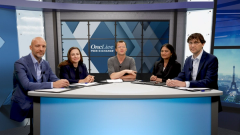
First-Line Therapy in Advanced Clear Cell RCC: Novel Doublet Regimens
An expert panel reviews novel first-line doublet therapies being studied in patients with advanced clear cell renal cell carcinoma.
Episodes in this series

Transcript:
Thomas Powles, MD: We’re moving on to some of the newer combinations and the combinations presented. Eric, could you talk to us a bit about the belzutifan-cabozantinib combination that we saw?
Eric Jonasch, MD: There are multiple efforts now. Belzutifan is a HIF-2α inhibitor. We got it approved last year for von Hippel-Lindau disease. There’s a robust program with this compound with combinations with various TKIs [tyrosine kinase inhibitors] as well as I/O [immuno-oncology] therapy. We don’t have any good biological rationale necessarily for combining HIF-2α with a TKI or with immunotherapy, but the clinical trials are proceeding.
This is a 35-patient phase II trial [DOI: 10.1056/NEJMoa2103425] in which individuals—mostly good-risk patients, previously untreated—received a combination of belzutifan 120 mg by mouth per day plus cabozantinib 40 mg. The primary end point was objective response, and the objective response rate was very good, 57%, and the PFS [progression-free survival] is an intriguing 30 months. Those are cool data; however, there are a couple of caveats. First, if you look at the second-line cabozantinib-belzutifan data, we have a progression-free survival of around 13 months and an objective response rate in the high-20% range, which is almost identical to belzutifan monotherapy. These wonderful data that we see—how much are driven by belzutifan alone? How much is cabozantinib adding to it? It’s a cautionary note as we start piling drugs upon drugs, as oncologists do.
Thomas Powles, MD: Let’s go around the table randomly. Ben, what about the PDIGREE trial? Do you know much about that PDIGREE study? What’s your take on it?
Benjamin Maughan, MD: This is an ongoing clinical trial effectively using response adaptation: how much should we intensify therapy vs continuing with somewhat less intensified therapy. Patients with previously untreated metastatic clear-cell kidney cancer are enrolled in the trial, and they’re started on their treatment of ipilimumab-nivolumab. Depending on that response, at 3 months, they get moved to 1 of 3 cohorts. If they have progressive disease, then they move to second-line cabozantinib. If they have a complete response, then they continue on nivolumab maintenance because you would do a standard of care.
Then there’s the mainstream section. If they don’t have progression and they don’t have complete response, and they have stable disease or partial response, then that group of patients is under investigation in this clinical trial. That group of patients then gets randomized to continuing nivolumab maintenance or the addition of cabozantinib-nivolumab to see if we can, with the intensification, further improve their response and durability. It has a couple of unique advantages of trying to minimize toxicity as opposed to intensifying and doing triplet therapy from the beginning. It also leverages some of these theoretical immunomodulatory effects of cabozantinib.
Thomas Powles, MD: Ulka, we’ll move to you. Are you going to go with bempegaldesleukin—bempegaldesleukin IL-2 plus nivolumab? We’ve got a press release saying the trial is not as positive as it was been presented at the meeting. Tell me a little about what’s going on.
Ulka Nitin Vaishampayan, MD: Bempegaldesleukin is a PEGylated interleukin that was investigated in combination with nivolumab. It showed preliminary but really promising efficacy in the phase 2 setting in combination. It was never investigated as a single agent in metastatic kidney cancer. The combination was compared with sunitinib or cabozantinib; the majority of patients were randomized to sunitinib. The combination did not show improvement in efficacy. There’s no difference in terms of parameters of efficacy, response rates, PFS, etc, compared with single-agent VEGF TKI.
Thomas Powles, MD: The first immune combination hasn’t been successful. It had a lot of success, but now it’s struggling a bit. Is the tide changing?
Ulka Nitin Vaishampayan, MD: It’s a disappointment. I don’t know the exact reasons for it.
Thomas Powles, MD: Can I push you on a different study, the CA209-8Y8 trial? That’s nivolumab vs ipilimumab-nivolumab. Does that trial worry you?
Ulka Nitin Vaishampayan, MD: Chances are, it’s not going to show that single-agent nivolumab isn’t similar to ipilimumab-nivolumab. There was the OMNIVORE study, and HCRN [Hoosier Cancer Research Network] conducted a study. Both seem to agree on up-front nivolumab, and then if you try to add ipilimumab, you salvage a small proportion of patients. You never can get to that up-front robust response rate.
Thomas Powles, MD: There’s refinement to the immune combinations but not huge progress. That’s fair.
Transcript edited for clarity.




































